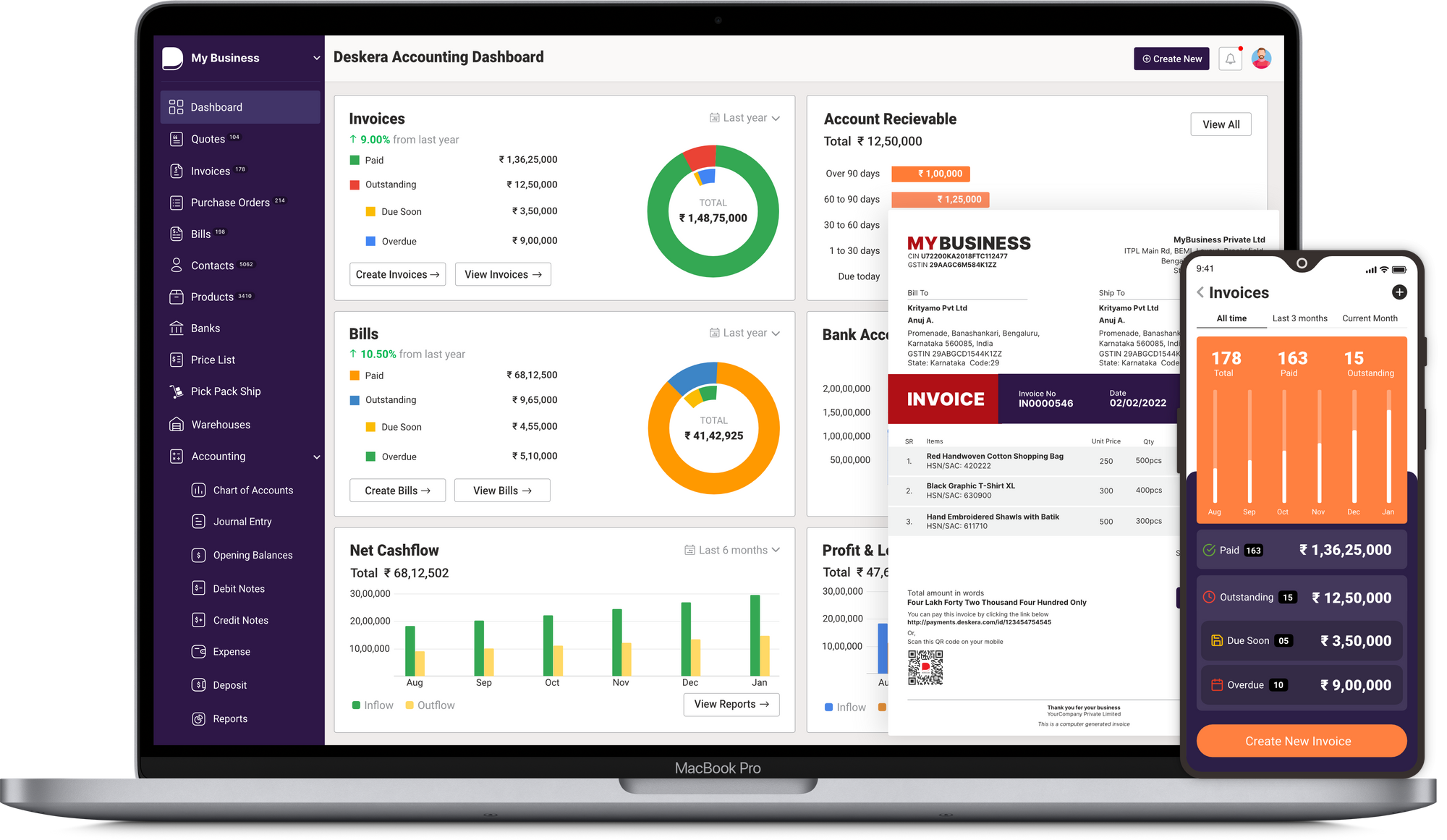Supplier management is an important part of any business, as it helps to ensure that the company is getting the best quality products and services from suppliers at the best possible prices. It also helps to ensure that the company is getting the best possible value for its money by ensuring that suppliers are reliable, efficient, and cost-effective.

This article covers the following:
- Introduction to supplier management
- Benefits of supplier management
- Challenges in supplier management
- How to overcome challenges in supplier management
- 4-steps for effective supplier management
- How can Deskera assist you?
Introduction to Supplier Management
Supplier management is the process of managing the relationships between a business and its suppliers in order to optimize the supply chain. It involves identifying, evaluating, collaborating with, and monitoring suppliers to ensure they are meeting business objectives.
Supplier management is an essential part of the procurement process. It ensures that the company is getting the best quality products and services at the best possible price. It also helps to streamline the supply chain and avoid costly delays or disruptions.
The supplier management process begins with the identification and selection of qualified suppliers. This involves researching and evaluating potential suppliers based on their qualifications, capabilities, and pricing. Once a supplier is selected, the supplier must be managed to ensure they are meeting their contractual obligations.
This includes monitoring performance, managing the supply chain, and addressing any issues that arise. It is also important to develop a strong relationship with suppliers. This can be done through regular communication and collaboration.
The goal is to ensure that both parties understand the terms of the agreement and are working together to achieve mutual goals. Finally, supplier management should focus on continuous improvement. This means regularly reviewing supplier performance and taking steps to improve it.
This can include providing training, setting up incentives, and introducing new technologies. By following the steps outlined above, businesses can ensure that they are getting the best out of their suppliers and optimizing the supply chain. This will help to improve customer satisfaction, reduce costs, and increase profits.
Benefits of Supplier Management
As organizations look to stay competitive and capture new business, supplier management has become an increasingly important topic. It’s critical for organizations to have a reliable supplier management strategy in place in order to remain competitive and maximize the value of their relationships with suppliers. Supplier management can provide a range of benefits, from improved product and service quality to cost savings and competitive advantages.
Improved Quality
One of the key benefits of supplier management is the improved product and service quality it can provide. Supplier management ensures that suppliers are held to high standards, providing organizations with a reliable source of quality products and services.
Supplier management also ensures that suppliers are held accountable for their performance, which can help to identify potential quality issues before they become a problem.
Cost Savings
Supplier management can help organizations reduce costs in a variety of ways. By identifying the most cost-effective suppliers and negotiating better pricing, organizations can improve their bottom line. Supplier management can also help organizations to reduce their inventory costs by ensuring that the right amount of inventory is purchased from suppliers.
Increased Efficiency
Supplier management can help organizations increase their efficiency by streamlining the procurement process and automating tasks. This can free up valuable resources and allow organizations to focus on their core activities.
Supplier management can also help organizations to reduce the amount of paperwork involved in the procurement process, which can help to speed up the process.
Improved Risk Management
Supplier management can help organizations to reduce the risk associated with their procurement activities. By working with reliable and dependable suppliers, organizations can ensure that they are getting the best quality products and services at the best price. Supplier management can also help organizations to identify potential risks and take steps to mitigate them, such as diversifying their supplier base.
Improved Relationships
Supplier management can help organizations to build better relationships with their suppliers. By setting clear expectations and developing strong communication channels, organizations can ensure that there is a mutual understanding between the two parties.
This can help to create a more collaborative and successful relationship with suppliers, which can lead to improved products and services. Supplier management is a critical part of any successful organization’s operations.
By taking the time to develop and implement a robust supplier management strategy, organizations can reap the many benefits it provides. From improved product and service quality to cost savings and increased efficiency, supplier management can provide organizations with a competitive advantage.
4 Steps for Effective Supplier Management
Step 1: Establish Clear and Effective Communication
Clear and effective communication is the foundation of successful supplier management. This involves setting up channels of communication between the supplier and your organization.
It also includes establishing protocols for exchanging information between the two parties. This could include a specific frequency of communication, a process for responding to requests, a format for sharing data, and guidelines for resolving disputes.
Step 2: Develop a Supplier Evaluation Program
A supplier evaluation program is an essential part of managing suppliers. This program should include criteria for evaluating suppliers, such as quality, value, delivery, and customer service.
You should also consider other factors, such as financial stability, sustainability practices, and compliance with regulations. A supplier evaluation program should also include a process for monitoring suppliers' performance.
Step 3: Negotiate Agreements
Negotiating agreements with suppliers is an important part of supplier management. You should negotiate contracts that clearly define expectations and responsibilities, such as delivery schedules, payment terms, and quality standards. You should also consider developing long-term agreements with suppliers that offer discounts or other incentives for meeting certain performance standards.
Step 4: Monitor Performance and Manage Risk
Once the agreements are in place, it's important to monitor suppliers' performance over time. This includes evaluating suppliers to ensure they are meeting their contractual obligations.
Additionally, you should also be aware of any changes in the supplier's financial health or other risk factors. This will allow you to take corrective action if necessary. By following these four steps, your organization can ensure that it has a successful relationship with its suppliers.
This will help to ensure that your organization is able to acquire the best quality products and services at the best price. Additionally, it will help to reduce the risk of supply chain disruptions and ensure that your organization is able to meet customer demands.
Challenges in Supplier Management
Supplier management is a critical component of any business. It’s essential for organizations to ensure that their suppliers are properly managed in order to maintain a successful working relationship. However, managing suppliers can be a difficult and challenging task. Here are some of the most common challenges associated with supplier management:
Visibility
One of the major challenges in supplier management is having a clear view of all suppliers and their related activities. It can be difficult to keep track of all the different suppliers that a business works with and ensure that all of its activities are monitored and reported on in a timely manner.
Communication
Effective communication is essential for any successful supplier relationship. Without proper communication, misunderstandings can occur, leading to delays and inefficiencies. It’s important to make sure that all suppliers are kept up to date on changes and are informed of any issues that may arise.
Quality Control
Maintaining a high level of quality control is essential for any business. Achieving this can be difficult when dealing with multiple suppliers, as each supplier may have different standards and processes. It’s important to ensure that all suppliers are held accountable to the same quality standards.
Cost Management
Suppliers can often be a major cost center for businesses, and it’s important to ensure that costs are kept to a minimum. This can involve monitoring supplier prices, negotiating better terms, or exploring alternative suppliers.
Regulatory Compliance
Many organizations must adhere to certain regulatory requirements when dealing with suppliers. It’s important to be aware of any regulations that may apply to the business and to ensure that all suppliers are compliant.
Managing suppliers can be a difficult and challenging task. It’s important to ensure that all of the above challenges are addressed in order to ensure a successful supplier management program.
By addressing these issues, businesses can ensure that their suppliers are properly managed and that a successful working relationship is maintained.
Tips to Overcome Challenges in Supplier Management
Supply chain management is a critical part of any business, and it’s essential to ensure that the suppliers you choose are reliable and trustworthy. However, managing suppliers can be a challenge, as there are many factors to consider, such as cost, quality, delivery times, and ethical standards. Here are some tips to help you to overcome the challenges of supplier chain management.
Perform Thorough Research
Before selecting a supplier, it’s important to do thorough research and evaluate their credentials. Make sure to look into their background, past performance, and customer reviews to get an accurate idea of their reliability.
Establish Clear Communication
Communication is key when it comes to supplier chain management. Make sure to establish clear lines of communication with your suppliers and ensure that they are informed of any changes or updates.
Monitor Performance
It’s important to keep an eye on supplier performance and ensure they are meeting their commitments. If any issues do arise, make sure to address them quickly and efficiently.
Negotiate Terms
Negotiating with suppliers can help you to get better terms and prices. Make sure to be clear about what you need and be willing to negotiate to get the best deal.
Streamline Processes
Streamlining processes can help to reduce costs and improve efficiency. Investing in technology such as supply chain management software can help to automate tasks and reduce manual labor.
Leverage Relationships
Building strong relationships with suppliers can help you to get better deals and better customer service. Make sure to nurture these relationships and keep your suppliers informed of any changes or updates.
By following these tips, you can ensure that your supply chain management is as efficient and cost-effective as possible. With the right strategies in place, you can make sure that your business runs smoothly and that your suppliers are reliable and trustworthy.
How Can Deskera Assist You?
Like every business, we are sure you aim for the skies too, and with Deskera, we can help you achieve your target. The Deskera software will improve your supply chain management in ways you have never seen before. Let us understand what these ways are.

To start with, with Deskera books, you can make your supply chain management a breeze. Manage your sales and orders from start to finish. Create estimates and convert them to invoices upon confirmation. Receive and record online payments automatically. Fulfill orders and keep track of your cost of goods sold.
Take charge of your inventory; now, manage all your inventory through a single dashboard. Whether you're picking, packing, shipping, or even dropshipping, we've got you covered.
Key Takeaways
- Supplier management is the process of managing the relationships between a business and its suppliers in order to optimize the supply chain.
- It’s critical for organizations to have a reliable supplier management strategy in place in order to remain competitive and maximize the value of their relationships with suppliers.
- Supplier management ensures that suppliers are held to high standards, providing organizations with a reliable source of quality products and services.
- Supplier management also ensures that suppliers are held accountable for their performance, which can help to identify potential quality issues before they become a problem.
- Supplier management can help organizations reduce costs in a variety of ways.
- Communication is key when it comes to supplier chain management. Make sure to establish clear lines of communication with your suppliers and ensure that they are informed of any changes or updates.
- Negotiating with suppliers can help you to get better terms and prices. Make sure to be clear about what you need and be willing to negotiate to get the best deal.
Related Articles:











